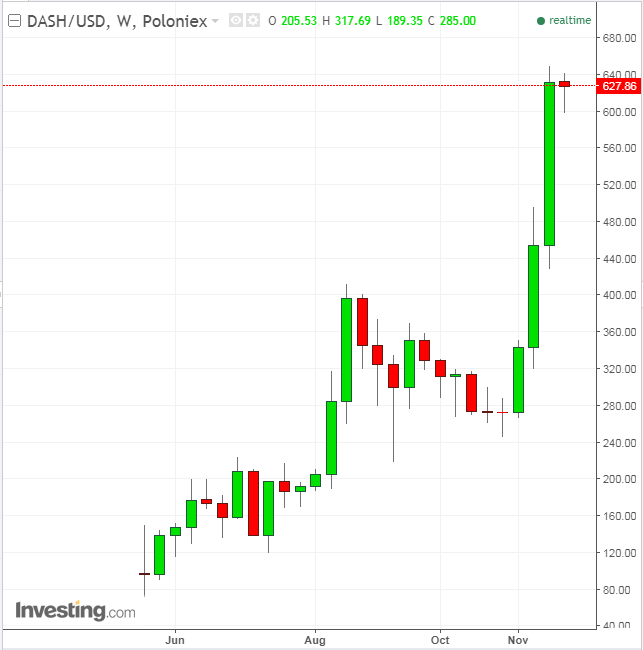Street Calls of the Week
by Tanzeel Akhtar
Even as all eyes have been focused on the price of Bitcoin, which yesterday smashed through the the $10,000 barrier, cryptocurrency Dash, has been on a record-setting spike of its own. Though it operates under the radar of many investors, last week Dash surged past the $600 mark.

Dash—currently the seventh most popular cryptocurrency with a market cap of $5.02 billion—was originally released as XCoin (XCO) on January 2014. Just days after its launch it was renamed Darkcoin because of its ability to ensure user anonymity by masking transactions and IP addresses, but rebranded as Dash (a shortened version of digital cash) during March 2015. According to The Cointelegraph, "the renaming was made to avoid associations with the underground markets and shadow business, and also to attract a wider audience."
An additional benefit Dash provides, also reflected in its name, is transaction speed. Send and confirm transactions can be done within seconds using Dash, whereas the same functions via Bitcoin, on average, can take 10 minutes, though extremely large transactions can take up to an hour.
If the digital currency has been around for a few years, why has it suddenly doubled in price over the past month, shooting up from $282 on October, 28 to $631 on November 28? There could be a number of reasons.
Political turmoil in Zimbabwe, which has long suffered from devastating inflation, caused many of the African country's citizens to turn to Bitcoin as a crisis currency/safe haven. The coup this month that brought down long-time President Robert Mugabe has added to the uncertainty.
In what can only be regarded as perfect timing, Dash recently announced it has now been made available to locals in Zimbabwe. The currency's backers have inked a joint venture with KuvaCash, a program claiming to have a solution for Zimbabwe's ballooning inflation, collapsing currency and declining national economy.
Sheffield Clark, CEO of Coinsource an American Bitcoin ATM network, based in Texas says:
“The joint venture they are executing with KuvaCash in Zimbabwe is a real game changer; value, of course, stems from not just supply and demand, but from adoption and potential. Dash's entrance in Africa will significantly improve the lives of thousands of people in Zimbabwe, who will enjoy access to a better form of currency, outside the failing fiat, failing USD-pegged bonds, and dirty dollar bills. From 1980 to 2017, under the rule of President Mugabe, Zimbabweans became an average of 15% poorer - it's humbling to know that one of our industry peers has the ability to turn that around, and affect so many people in such a positive way.”
Clark notes that Dash is no longer flying under the radar as one of the most promising cryptocurrency projects to date. Hundreds of regions around the world are beginning to benefit from its position as the top digital currency for payments.
Another reason Dash may have suddenly started moving could be due to South Korean buyers attracted to the alt currency. According to data from CoinMarketCap, nearly have of Dash's volume comes from South Korea's Bithumb exchange. Increased Korean demand is likely another main price driver.
Friendly government regulations in the Asian nation, which aim to give cryptocurrencies legal status, may also have spurred digital currency investor activity in the region. The Korea Herald reported this summer that Bithumb accounts for 75.7% of Bitcoin's South Korean Bitcoin market volume, as well as about 10% of the global Bitcoin trade.
As well, there's the November 8 release of Dash Core version 12.2 which delivered both a 10 times reduction in transaction fees and an upgrade to 2MB blocks.
Is Dash the New Cash?
Perry Woodin, CEO of Node40, a blockchain governance and cryptocurrency tax compliance company based in New York, believes that as digital currency in general captures more media attention, we will likely see many of the top 10 digital currencies rise in value. He says:
”Investors are finally starting to evaluate Bitcoin’s promise and utility. The promise of Bitcoin was a decentralized form of cash. It has become increasingly clear that Bitcoin can’t fulfill the role of digital cash, so savvy investors are starting to look at viable alternatives like Dash.”
What makes the valuation rise in Dash unique is its utility as a payments platform notes Woodin. He explains that Dash is the only digital currency that can support on-chain transactions rivaling the speed of credit cards.
“Investors who understand the differences between the various digital currencies are betting on Dash and driving the price to new All-Time Highs.”
The official Dash blog posits that traders may be tiring of the whole Bitcoin/Bitcoin siblings rivalry and are finally turning to what's been the elephant in the room all along. From the blog, regarding trader activity: "going purely by stat charts, it appears they [have] quietly turned to Dash."
Bitcoin may continue to steal the limelight, but, as recent Dash activity signals, it would be wise not to ignore the potential of certain alternative cryptocurrencies.
